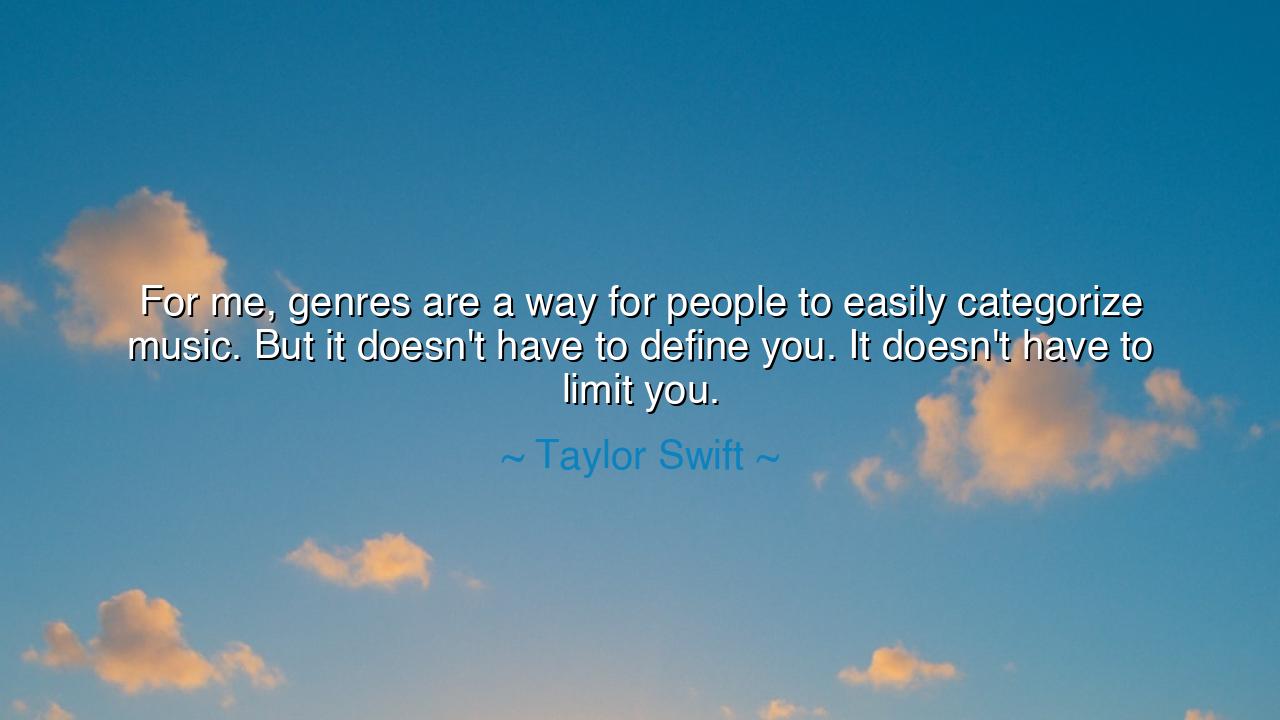
For me, genres are a way for people to easily categorize music.
For me, genres are a way for people to easily categorize music. But it doesn't have to define you. It doesn't have to limit you.






When the songstress Taylor Swift declared, “For me, genres are a way for people to easily categorize music. But it doesn’t have to define you. It doesn’t have to limit you,” she spoke a truth that reaches far beyond melody and lyric. Her words shine like a beacon to all who feel trapped by the labels the world places upon them. Genres, like titles and roles, may be useful for others to understand you, but they are not chains to bind your spirit. For the human soul, like music itself, is vast, ever-changing, and cannot be contained by a single word.
The ancients, too, understood this. The philosophers of Greece divided men into categories: the thinker, the warrior, the craftsman. But history proved that the greatest among them defied these boundaries. Alexander the Great was not merely a soldier—he was also a student of Aristotle, a lover of philosophy, a builder of cities. Leonardo da Vinci, in the Renaissance, was not confined to being a painter; he was an inventor, an engineer, a visionary. So too does Swift remind us: to accept labels as the limits of our being is to deny the infinite expanse of what we might become.
Her own life offers the clearest example. Swift began her journey in country music, telling simple stories of small towns and young love. But as she grew, she shed that skin and stepped boldly into pop, crafting anthems that thundered across the world. Later still, she explored indie-folk, soft and introspective, and reclaimed her past through re-recordings. Each time, the world tried to bind her to a single genre, but she broke free, proving that the artist must follow the voice within, not the categories imposed from without.
History bears similar witness. Bob Dylan, once crowned the voice of protest folk, shocked his audience when he picked up the electric guitar and stepped into rock. His fans booed, critics raged, but Dylan pressed on, for he refused to be caged by genre. In time, his boldness transformed music itself. His story and Swift’s both echo the truth of her words: genres may organize, but they cannot define, unless we surrender our freedom to them.
The meaning of Swift’s words is deeply human. All people are given labels: student, worker, parent, artist. These may help others recognize us, but they are not the whole of who we are. To let them limit us is to live only a fraction of our true life. Each soul, like a song, has verses yet unwritten, melodies yet unplayed. To cling too tightly to one category is to silence the music still waiting to be born.
The lesson for us is powerful: do not let the world’s categories confine you. You may be one thing today and another tomorrow, and both are true. You may love one craft now and another later, and both are worthy. You may grow beyond what others expect of you, and that is not betrayal—it is freedom. Your spirit is not a genre to be filed away, but a living symphony, rising and changing with every season of life.
Practical wisdom follows. Explore widely. If your heart calls you to a new path, follow it without fear, even if it defies the categories others have placed on you. Learn from every field, every art, every experience, and let each add a new note to your song. Do not bind yourself to one identity, for growth is the nature of life. And when others try to confine you, remember Swift’s words: genres may describe, but they do not define.
Therefore, let us hold fast to her teaching: “It doesn’t have to define you. It doesn’t have to limit you.” Break free of labels, surpass expectations, and let your life be like music—flowing, diverse, ever-changing, yet always true. For the spirit that refuses to be confined is the spirit that will create, endure, and inspire, leaving behind a song that echoes for generations.






AAdministratorAdministrator
Welcome, honored guests. Please leave a comment, we will respond soon